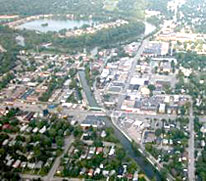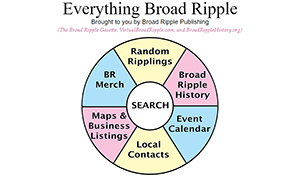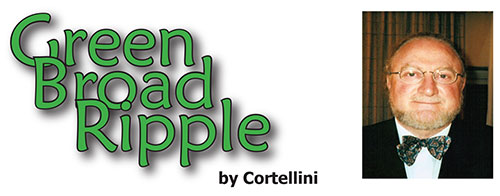
|
Broad Ripple Random Ripplings

The news from Broad Ripple
Brought to you by The Broad Ripple Gazette
(Delivering the news since 2004, every two weeks)

|
| Brought to you by: |

|

|

|

|

|

|
Converted from paper version of the Broad Ripple Gazette (v03n25)
Green Broad Ripple - Community - Ethical Commerce - by Cortellini
posted: Dec. 15, 2006

Community - Ethical Commerce
Food is the most intimate of all products we purchase. Indispensable to life, it can also be the source of great pleasure and enjoyment. In many families the table is still the center of family culture. We take food into our bodies and it becomes part of us - literally, we are what we eat. The importance of food to our well being is difficult to overstate, and the choices we make in the selection of food have consequences that extend far beyond the palate.
Last Thursday I had a conversation with Nick Brown, store director of Sunflower Market, a recent newcomer to our neighborhood. I am happy to report that Nick appears quite aware of his community membership, as does Sunflower Corporate. Nick related that Sunflower Markets carry mostly certified organic food and locally produced products. They do so not only to satisfy a growing demand by the customer but also out of a certain ethical sense that it is the right thing to do.
Organic farming is not new. It is a natural way developed over the 10,000 years of human agriculture before the farm industrialization of the last 75 years. Organic rejects the use of any synthetic fertilizers, pesticides, and herbicides. The most relevant consequences of synthetic chemical use are that farm products retain a chemical residue that is unhealthful when ingested by people and animals; chemicals destroy the micro ecosystem of soil, reducing a natural, healthy, alive, and self-rejuvenating system to a dead medium that serves as a mere plant anchor; chemical run-off and aquifer penetration poisons water; and synthetic chemicals consume a huge amount of energy in their manufacture, contributing to global warming. Certified Organic cropland more than doubled from 1992 to 1997 and doubled again between 1997 and 2003. More and more farmers are turning Organic as a response to the growing market demand. Yet, the ones I know personally do it largely because they are convinced that it is the right thing to do.
Food produced by the conventional system travels an average of 1,300 miles from farm to plate consuming 80 cents of every food dollar on storage, handling, transportation, and retail costs. Only 20 cents finds its way back to the farmer. Because of the distance factor, produce is picked prematurely and ripened with chemicals. While this produces a product that may have eye appeal, taste and nutritional value are diminished during the long shipping and storage process. Emphasis on system efficiency has greatly reduced the diversity of crops being grown in the U.S. My wife Patty purchases local products because of their just-picked freshness. She likes the idea that more of her food dollar goes to the farmer, hoping this may play a part in the revitalization of our rural communities. She likes knowing where her food came from, how it was grown, and who grew it. She celebrates the variety and seasonality of our food experience and yes, she knows that, in a very practical sense, it is the right thing to do.
Our Sunflower Market donated 30 tons of food to Second Helpings last year. It recycles all store refuse, including one half ton of cardboard per week. It provides bicycle racks and two recycle bins for customer use even as public recycling drop-offs are being reduced. Future plans include an expansion of recycling facilities and bike racks; a composting program that could support community gardens; and development of improved store management techniques to affect cost savings, resulting in price reductions so that Organic may become more accessible.
It seems to me that this spirit is the essence of Ethical Commerce. Commerce is a necessary part of life in our community. We need to do business, yet we can do so in an ethical way - a way that is considerate of the welfare of our neighbors, supportive of our community, and contributes to the long-term health of the Earth. Ethical Commerce is definitely doable and, in the end, is the Green thing to do.
Cortellini is a licensed architect in the states of Indiana and Arizona. He holds a BFA from Indiana University Herron School of Art. He has taught architectural technology at the college level at several universities and has pursued independent artistic endeavors. His architectural practice has focused on residential and small commercial projects. He has recently committed his practice to designing Green buildings, is a member of the US Green Building Council and is a LEED Accredited Professional. Send questions/comments to cortellini@BroadRippleGazette.com
cortellini@broadripplegazette.com

|

|

|
| Brought to you by: |

|

|

|
| Brought to you by: |

|

|

|


